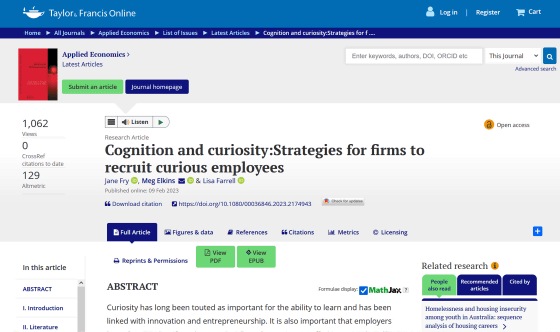Researchers argue that reading has a positive impact on mental health and career, and advice on developing reading habits

In recent years, entertainment that can be stimulated in a short time, such as short videos on TikTok and Instagram, and short sentences on X (formerly Twitter), has become popular, and some people may say that they are moving away from reading, which takes a long time to enjoy. However,
Full article: Cognition and curiosity: Strategies for firms to recruit curious employees
https://www.tandfonline.com/doi/full/10.1080/00036846.2023.2174943

Why reading books is good for society, wellbeing and your career
https://theconversation.com/why-reading-books-is-good-for-society-wellbeing-and-your-career-200447
Elkins et al. found that consuming large amounts of short-lived content on various social media impairs concentration , distraction from social media increases stress , and comparing oneself to others worsens mental health. Then pointed out. 'For better mental health, call me a book,' it claims.
Previous research suggests that reading books has many benefits. For example, reading fiction has been shown to enhance people's empathy through the process of seeing the world through the eyes of characters, and research results have been reported that reading reduces stress as much as yoga.

A new research team led by Elkins et al. conducted a study to investigate ``whether reading develops human curiosity.'' Nurturing curiosity is a vital part of a career, as many innovations in history have been driven by curiosity, and curiosity has become one of the qualities technology companies such as Google value when hiring. It is important.
The research team extracted data from
The research team examined the relationship between the level of curiosity at the age of 20, when many of the subjects were employed or were beginning to consider employment, and their reading habits in their lives. Survey data included test scores on subjects' reading, math, and scientific skills, and survey results on time spent reading for recreational purposes, time spent reading newspapers and magazines, frequency of library use, and more. .
Also, curiosity measures include ``whether you want to learn new things'', ``whether you think about why the world is the way it is'', ``whether you want to know more about things you don't understand'', ``whether you want to know more about new ideas'' Questions such as 'Are you curious about how certain things work?' were used.
The researchers used statistical modeling to control for environmental and demographic factors and analyzed whether teenage reading habits affected curiosity levels at age 20. The results showed that the propensity to read books and newspapers for entertainment was positively correlated with the level of curiosity in all study groups. The research team said, ``The importance of reading cannot be underestimated. The literature teaches us important things academically. It seems related,' he said.

Although the results of this study were aimed at adolescents, the research team said that there is a good chance that reading can foster curiosity even at older ages, and at least it is superior to SNS in terms of mental health. pointed out. Here are some tips for those who want to develop a new reading habit:
・Keep a book with you at all times or place it in an easily accessible place in your home.
・Reinforce your reading habit by setting aside 20 minutes a day to read.
・If you don't enjoy one book, don't force yourself to read another.
'Reading will make you feel better,' Elkins and others said, and be prepared for future employers to ask, 'What books are you reading?' Ta.

Related Posts:
in Science, Posted by log1h_ik







